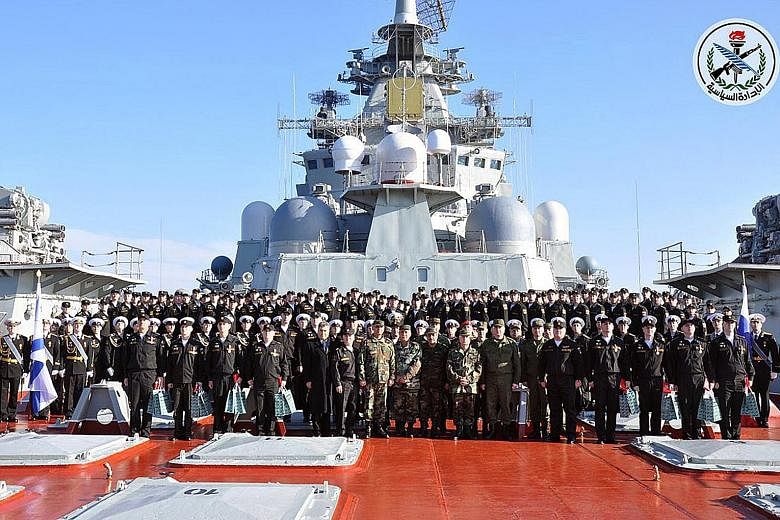BEIRUT • Russia has signed a long-term agreement to greatly enlarge its military presence in Syria, more than doubling the space for warships in Russia's only Mediterranean port and securing rights to an air base that may already be adding a second runway.
The agreement covers the port in Tartus and an air base near Latakia, which have been pivotal in Russian assistance to President Bashar al-Assad of Syria in fighting an array of insurgents.
It ensures Russia's ability to deploy forces in Syria for the next half-century and perhaps beyond.
News of the agreement came as Mr Assad received what appeared to be another positive development: A Turkish official suggested publicly for the first time that Turkey would accept a peace deal in Syria's six-year war that would allow Mr Assad to stay in power.
The remarks by Deputy Prime Minister Mehmet Simsek, at the World Economic Forum in Davos, Switzerland, indicated that Turkey - Syria's northern neighbour and one of Mr Assad's most implacable foes - had softened its position in the interest of finding a solution.

While Turkey's government later said that Mr Simsek's remarks had been misconstrued, it was clear that he had said a settlement without Mr Assad would be "not, you know, realistic".
Both developments came as Russia, Turkey and Iran prepared to convene Syrian peace talks in Astana, the capital of Kazakhstan, today. For the first time, it seemed likely that the main Syrian opposition, along with many other factions, would sit down with Mr Assad's government for talks.
The last effort at such negotiations was held by the United Nations in Geneva in February last year, and it collapsed within days.
The new Russian military agreement with Syria provides for an expansion of Russia's Tartus naval base on the Syrian coast under a 49-year lease that can be renewed for a further 25 years, according to Tass, the Russian news agency.
Tass said the expansion would provide berths for up to 11 warships, including nuclear-powered vessels, more than doubling its known capacity.
Tass said the agreement also provided for a similar long-term commitment for Russia to use the Khmeimim Air Base in the Latakia area, which the Russians built in 2015 as they mobilised to help Mr Assad's forces. There were news reports that the Russians were building a second runway at the base.
The military deal came despite Russia's announcement this month that it was drawing down its forces in Syria after successes by the Assad government against Syrian rebels, with substantial help from the Russians.
The Russian-Syrian agreement came as momentum grew among dissidents to join the peace talks in Astana, although it is a foregone conclusion that any deal from these negotiations will be rejected by Islamists. At least 14 rebel factions are participating.
At the Turkish government's insistence, however, Kurdish groups fighting the Islamic State in Iraq and Syria group in the east of the country and backed by the United States were not invited.
Turkey's government has accused those Kurdish groups of affiliations with militant Kurdish separatists in Turkey.
The Astana talks are the outcome of a Russian-brokered ceasefire throughout Syria that began at the end of December. It has been widely observed except in areas where Islamist factions prevail - but with many accusations of breaches elsewhere as well.
Russia is the lead host of the talks in the Kazakh capital, with support from Turkey and Iran. Over the last week, Turkey and Russia have also invited the United States and the United Nations to attend the Astana negotiations.
NYTIMES

